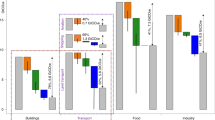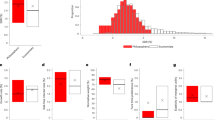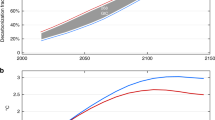Abstract
Climate change and decarbonization raise complex justice questions that researchers and policymakers must address. The distributions of greenhouse gas emissions rights and mitigation efforts have dominated justice discourses within scenario research, an integrative element of the IPCC. However, the space of justice considerations is much larger. At present, there is no consistent approach to comprehensively incorporate and examine justice considerations. Here we propose a conceptual framework grounded in philosophical theory for this purpose. We apply this framework to climate mitigation scenarios literature as proof of concept, enabling a more holistic and multidimensional investigation of justice. We identify areas of future research, including new metrics of service provisioning essential for human well-being.
This is a preview of subscription content, access via your institution
Access options
Access Nature and 54 other Nature Portfolio journals
Get Nature+, our best-value online-access subscription
$29.99 / 30 days
cancel any time
Subscribe to this journal
Receive 12 print issues and online access
$209.00 per year
only $17.42 per issue
Buy this article
- Purchase on Springer Link
- Instant access to full article PDF
Prices may be subject to local taxes which are calculated during checkout


Similar content being viewed by others
References
IPCC Climate Change 2022: Mitigation of Climate Change (eds Shukla, P. R. et al.) (Cambridge Univ. Press, 2022).
Robinson, M. & Shine, T. Achieving a climate justice pathway to 1.5 °C. Nat. Clim. Change 8, 564–569 (2018).
Alemayehou, M. et al. Reframing Climate Justice for Development (Energy for Growth Hub, 2021).
Carley, S. & Konisky, D. M. The justice and equity implications of the clean energy transition. Nat. Energy 5, 569–577 (2020).
Gardiner, S. M. Ethics and global climate change. Ethics 114, 555–600 (2004).
Dolšak, N. & Prakash, A. Three faces of climate justice. Annu. Rev. Polit. Sci. 25, 283–301 (2022).
Grasso, M. A normative ethical framework in climate change. Climatic Change 81, 223–246 (2007).
Krueger, T., Page, T., Hubacek, K., Smith, L. & Hiscock, K. The role of expert opinion in environmental modelling. Environ. Model. Softw. 36, 4–18 (2012).
Caney, S. Just emissions. Phil. Public Aff. 40, 255–300 (2012).
Newell, P., Srivastava, S., Naess, L. O., Torres Contreras, G. A. & Price, R. Toward transformative climate justice: an emerging research agenda. WIREs Clim. Change 12, e733 (2021).
van Beek, L., Oomen, J., Hajer, M., Pelzer, P. & van Vuuren, D. Navigating the political: an analysis of political calibration of integrated assessment modelling in light of the 1.5 °C goal. Environ. Sci. Policy 133, 193–202 (2022).
Dooley, K. et al. Ethical choices behind quantifications of fair contributions under the Paris Agreement. Nat. Clim. Change 11, 300–305 (2021).
Fleurbaey, M. et al. in Climate Change 2014: Mitigation of Climate Change (eds Edenhofer, O. et al.) Ch. 4 (Cambridge Univ. Press, 2014).
Victor, D. G., Carraro, C. & Olmstead, S. M. in Architectures for Agreement: Addressing Global Climate Change in the Post-Kyoto World (eds Aldy, J. E. & Stavins, R. N.) 133–184 (Cambridge Univ. Press, 2007).
Klinsky, S. et al. Why equity is fundamental in climate change policy research. Glob. Environ. Change 44, 170–173 (2017). Klinsky et al. debate the relevancy of questions of equity in climate policy research.
Bergquist, M., Nilsson, A., Harring, N. & Jagers, S. C. Meta-analyses of fifteen determinants of public opinion about climate change taxes and laws. Nat. Clim. Change 12, 235–240 (2022).
Rawls, J. A Theory of Justice (Harvard Univ. Press, 1971). Rawls developed the distinctions between distributive and procedural justice, in particular the role of procedural justice in making an outcome just or merely providing evidence for the just outcome. Our account of transitional justice developed Rawlsian ideas.
Miller, D. in The Stanford Encyclopedia of Philosophy (eds Zalta, E. N. & Nodelman, U.) https://plato.stanford.edu/archives/fall2023/entries/justice/ (Stanford Univ., 2021). Miller offers a key summary of the justice literature in philosophy and, importantly for our project, indicates how corrective and distributive justice are orthogonal to each other.
Macron, E. et al. 'A green transition that leaves no one behind’: world leaders release open letter. The Guardian (20 June 2023).
Wallimann-Helmer, I., Meyer, L., Mintz-Woo, K., Schinko, T. & Serdeczny, O. in Loss and Damage from Climate Change: Concepts, Methods and Policy Options (eds Mechler, R. et al.) 39–62 (Springer, 2019).
Hourdequin, M. Geoengineering justice: the role of recognition. Sci. Technol. Hum. Values 44, 448–477 (2019).
Preston, C. & Carr, W. Recognitional justice, climate engineering, and the care approach. Ethics Policy Environ. 21, 308–323 (2018).
Linsenmeier, M., Mohommad, A. & Schwerhoff, G. Policy sequencing towards carbon pricing among the world’s largest emitters. Nat. Clim. Change 12, 1107–1110 (2022).
Sommons, A. J. Ideal and nonideal theory. Phil. Public Aff. 38, 5–36 (2010).
World Commission on Environment and Development Our Common Future (Oxford Univ. Press, 1987).
Deutsch, M. Equity, equality, and need: what determines which value will be used as the basis of distributive justice? J. Soc. Issues 31, 137–149 (1975).
Sen, A. in Tanner Lectures on Human Values Vol. 1 (ed. McMurrin, S. M.) 195–220 (Cambridge Univ. Press, 1980).
Sen, A. What do we want from a theory of justice? J. Phil. 103, 215–238 (2006).
Shue, H. Subsistence emissions and luxury emissions. Law Policy 15, 39–60 (1993).
Rubiano Rivadeneira, N. & Carton, W. (In)justice in modelled climate futures: a review of integrated assessment modelling critiques through a justice lens. Energy Res. Soc. Sci. 92, 102781 (2022).
Morgan, M. G. & Mellon, C. Certainty, uncertainty, and climate change. Climatic Change 108, 707 (2011).
Heath, J. Climate ethics: justifying a positive social time preference. J. Moral Phil. 14, 435–462 (2017).
Adler, M. et al. Priority for the worse-off and the social cost of carbon. Nat. Clim. Change 7, 443–449 (2017).
Arneson, R. J. Prioritarianism (Cambridge Univ. Press, 2022).
Parfit, D. Equality and priority. Ratio 10, 202–221 (1997).
Casal, P. Why sufficiency is not enough. Ethics 117, 296–326 (2007).
Herlitz, A. The indispensability of sufficientarianism. Crit. Rev. Int. Soc. Polit. Phil. 22, 929–942 (2019).
Huseby, R. Sufficiency and the threshold question. J. Ethics 24, 207–223 (2020).
Rao, N. D. & Min, J. Decent living standards: material prerequisites for human wellbeing. Soc. Indic. Res. 138, 225–244 (2018).
Robeyns, I. Why limitarianism?. J. Polit. Phil. 30, 249–270 (2022).
Miner, K. et al. The co-production of knowledge for climate science. Nat. Clim. Change https://doi.org/10.1038/s41558-023-01633-4 (2023).
Fehr, C. in Feminist Epistemology and Philosophy of Science: Power in Knowledge (ed. Grasswick, H.) 133–154 (Springer, 2011).
Caney, S. Justice and future generations. Annu. Rev. Polit. Sci. 21, 475–493 (2018).
Perkins, P. E. in Routledge Handbook of Climate Justice 349–358 (Routledge, 2018).
Whyte, K. Too late for indigenous climate justice: ecological and relational tipping points. WIREs Clim. Change 11, e603 (2020).
Gay-Antaki, M. & Liverman, D. Climate for women in climate science: women scientists and the Intergovernmental Panel on Climate Change. Proc. Natl Acad. Sci. USA 115, 2060–2065 (2018).
Ravikumar, A. P. et al. Enabling an equitable energy transition through inclusive research. Nat. Energy https://doi.org/10.1038/s41560-022-01145-z (2022).
Jafino, B. A., Kwakkel, J. H. & Taebi, B. Enabling assessment of distributive justice through models for climate change planning: a review of recent advances and a research agenda. WIREs Clim. Change 12, e721 (2021). Jafino et al. discuss ways for IAMS to tackle different distributional justice issues.
Beck, M. & Krueger, T. The epistemic, ethical, and political dimensions of uncertainty in integrated assessment modeling. WIREs Clim. Change 7, 627–645 (2016).
Klinsky, S. & Winkler, H. Building equity in: strategies for integrating equity into modelling for a 1.5 °C world. Phil. Trans. R. Soc. A 376, 20160461 (2018).
Lenzi, D., Lamb, W. F., Hilaire, J., Kowarsch, M. & Minx, J. C. Don’t deploy negative emissions technologies without ethical analysis. Nature 561, 303–305 (2018).
O’Neill, B. C. et al. A new scenario framework for climate change research: the concept of shared socioeconomic pathways. Climatic Change 122, 387–400 (2014).
Riahi, K. et al. The Shared Socioeconomic Pathways and their energy, land use, and greenhouse gas emissions implications: an overview. Glob. Environ. Change 42, 153–168 (2017).
van Vuuren, D. P. et al. The representative concentration pathways: an overview. Climatic Change 109, 5 (2011).
O’Neill, B. C. et al. Achievements and needs for the climate change scenario framework. Nat. Clim. Change 10, 1074–1084 (2020).
Pedersen, J. T. S. et al. IPCC emission scenarios: how did critiques affect their quality and relevance 1990–2022? Glob. Environ. Change 75, 102538 (2022).
van Ruijven, B. J. et al. Forum on Scenarios for Climate and Societal Futures: Meeting Report (International Institute for Applied Systems Analysis, 2022).
Green, C. et al. Shared Socioeconomic Pathways (SSPs) Literature Database v1 (2014–2019) (NASA SEDAC, 2021).
Green, C. et al. Shared Socioeconomic Pathways (SSPs) Literature Database v2 (2020–2021; Preliminary Release) (NASA SEDAC, 2022).
O’Neill, B. C. et al. The roads ahead: narratives for shared socioeconomic pathways describing world futures in the 21st century. Glob. Environ. Change 42, 169–180 (2017).
IPCC Special Report on Emissions Scenarios (eds Nakicenovic, N. et al.) (Cambridge Univ. Press, 2000).
Ebi, K. L. et al. A new scenario framework for climate change research: background, process, and future directions. Climatic Change 122, 363–372 (2014).
KC, S. & Lutz, W. The human core of the shared socioeconomic pathways: population scenarios by age, sex and level of education for all countries to 2100. Glob. Environ. Change 42, 181–192 (2017).
Kriegler, E. et al. A new scenario framework for climate change research: the concept of shared climate policy assumptions. Climatic Change 122, 401–414 (2014).
Bauer, N. et al. Quantification of an efficiency–sovereignty trade-off in climate policy. Nature 588, 261–266 (2020).
Liu, J.-Y., Fujimori, S. & Masui, T. Temporal and spatial distribution of global mitigation cost: INDCs and equity. Environ. Res. Lett. 11, 114004 (2016).
Höhne, N., den Elzen, M. & Escalante, D. Regional GHG reduction targets based on effort sharing: a comparison of studies. Clim. Policy 14, 122–147 (2014).
Robiou du Pont, Y. et al. Equitable mitigation to achieve the Paris Agreement goals. Nat. Clim. Change 7, 38–43 (2017).
van den Berg, N. J. et al. Implications of various effort-sharing approaches for national carbon budgets and emission pathways. Climatic Change 162, 1805–1822 (2020).
Pachauri, S., Poblete-Cazenave, M., Aktas, A. & Gidden, M. J. Access to clean cooking services in energy and emission scenarios after COVID-19. Nat. Energy 6, 1067–1076 (2021).
Hasegawa, T., Havlík, P., Frank, S., Palazzo, A. & Valin, H. Tackling food consumption inequality to fight hunger without pressuring the environment. Nat. Sustain. 2, 826–833 (2019).
Grubler, A. et al. A low energy demand scenario for meeting the 1.5 °C target and sustainable development goals without negative emission technologies. Nat. Energy 3, 515–527 (2018). Grubler et al. describe a scenario that reflects sufficientarian and limitarian patterns for diverse services and goods related to energy demand.
Soergel, B. et al. A sustainable development pathway for climate action within the UN 2030 Agenda. Nat. Clim. Change 11, 656–664 (2021). Soergel et al. study a scenario satisfying diverse indicators related to human well-being.
Steininger, K. W., Williges, K., Meyer, L. H., Maczek, F. & Riahi, K. Sharing the effort of the European Green Deal among countries. Nat. Commun. 13, 3673 (2022).
Żebrowski, P., Dieckmann, U., Brännström, Å., Franklin, O. & Rovenskaya, E. Sharing the burdens of climate mitigation and adaptation: incorporating fairness perspectives into policy optimization models. Sustainability 14, 3737 (2022). Żebrowski et al. discuss different patterns of distributive justice and how models could implement them.
Ueckerdt, F. et al. The economically optimal warming limit of the planet. Earth Syst. Dynam. 10, 741–763 (2019).
Chen, Y., Liu, A. & Cheng, X. Quantifying economic impacts of climate change under nine future emission scenarios within CMIP6. Sci. Total Environ. 703, 134950 (2020).
Benveniste, H., Boucher, O., Guivarch, C., Treut, H. L. & Criqui, P. Impacts of nationally determined contributions on 2030 global greenhouse gas emissions: uncertainty analysis and distribution of emissions. Environ. Res. Lett. 13, 014022 (2018).
King, A. D. & Harrington, L. J. The inequality of climate change from 1.5 to 2 °C of global warming. Geophys. Res. Lett. 45, 5030–5033 (2018).
Yang, P. et al. Solely economic mitigation strategy suggests upward revision of nationally determined contributions. One Earth 4, 1150–1162 (2021).
Pye, S. et al. An equitable redistribution of unburnable carbon. Nat. Commun. 11, 3968 (2020).
Byers, E. et al. Global exposure and vulnerability to multi-sector development and climate change hotspots. Environ. Res. Lett. 13, 055012 (2018).
Bijl, D. L. et al. A physically-based model of long-term food demand. Glob. Environ. Change 45, 47–62 (2017).
van Meijl, H. et al. Modelling alternative futures of global food security: insights from FOODSECURE. Glob. Food Secur. 25, 100358 (2020).
Molotoks, A., Smith, P. & Dawson, T. P. Impacts of land use, population, and climate change on global food security. Food Energy Secur. 10, e261 (2021).
Jaccard, I. S., Pichler, P.-P., Többen, J. & Weisz, H. The energy and carbon inequality corridor for a 1.5 °C compatible and just Europe. Environ. Res. Lett. 16, 064082 (2021).
Millward-Hopkins, J. & Oswald, Y. ‘Fair’ inequality, consumption and climate mitigation. Environ. Res. Lett. 16, 034007 (2021).
Mitter, H. et al. Shared Socio-economic Pathways for European agriculture and food systems: the Eur-Agri-SSPs. Glob. Environ. Change 65, 102159 (2020).
Palazzo, A. et al. Linking regional stakeholder scenarios and shared socioeconomic pathways: quantified West African food and climate futures in a global context. Glob. Environ. Change 45, 227–242 (2017).
Díaz, S. et al. Pervasive human-driven decline of life on Earth points to the need for transformative change. Science 366, eaax3100 (2019).
Pachauri, S. et al. Fairness considerations in global mitigation investments. Science https://doi.org/10.1126/science.adf0067 (2022).
Ellenbeck, S. & Lilliestam, J. How modelers construct energy costs: discursive elements in energy system and integrated assessment models. Energy Res. Soc. Sci. 47, 69–77 (2019).
Majszak, M. & Jebeile, J. Expert judgment in climate science: how it is used and how it can be justified. Stud. Hist. Phil. Sci. 100, 32–38 (2023).
Drupp, M. A., Freeman, M. C., Groom, B. & Nesje, F. Discounting disentangled. Am. Econ. J. Econ. Policy 10, 109–34 (2018).
Fleurbaey, M. et al. The social cost of carbon: valuing inequality, risk, and population for climate policy. Monist 102, 84–109 (2019).
Mintz-Woo, K. in The Impacts of Climate Change (ed. Letcher, T. M.) 521–535 (Elsevier, 2021).
Wei, Y.-M. et al. Self-preservation strategy for approaching global warming targets in the post-Paris Agreement era. Nat. Commun. 11, 1624 (2020).
Clayton, S. The role of perceived justice, political ideology, and individual or collective framing in support for environmental policies. Soc. Justice Res. 31, 219–237 (2018).
Meckling, J., Sterner, T. & Wagner, G. Policy sequencing toward decarbonization. Nat. Energy 2, 918–922 (2017).
Meyer, L. H. & Sanklecha, P. (eds) Climate Justice and Historical Emissions (Cambridge Univ. Press, 2017).
Mintz-Woo, K. & Leroux, J. What do climate change winners owe, and to whom? Econ. Phil. 37, 462–483 (2021).
Kothari, A., Demaria, F. & Acosta, A. Buen vivir, degrowth and ecological swaraj: alternatives to sustainable development and the green economy. Development 57, 362–375 (2014).
McCauley, D. & Heffron, R. Just transition: integrating climate, energy and environmental justice. Energy Policy 119, 1–7 (2018).
Dearing, J. A. et al. Safe and just operating spaces for regional social-ecological systems. Glob. Environ. Change 28, 227–238 (2014).
Lamb, W. F. et al. Discourses of climate delay. Glob. Sustain. 3, e17 (2020).
Peng, W. et al. Climate policy models need to get real about people—here’s how. Nature https://doi.org/10.1038/d41586-021-01500-2 (2021).
Budolfson, M. B. et al. Utilitarian benchmarks for emissions and pledges promote equity, climate and development. Nat. Clim. Change 11, 827–833 (2021).
Beiser-McGrath, L. F. & Bernauer, T. Could revenue recycling make effective carbon taxation politically feasible? Sci. Adv. 5, eaax3323 (2019).
Author information
Authors and Affiliations
Corresponding authors
Ethics declarations
Competing interests
The authors declare no competing interests.
Peer review
Peer review information
Nature Climate Change thanks Can Wang, Dominic Roser, Simona Capisani and the other, anonymous, reviewer(s) for their contribution to the peer review of this work.
Additional information
Publisher’s note Springer Nature remains neutral with regard to jurisdictional claims in published maps and institutional affiliations.
Supplementary information
Supplementary Information
Supplementary Figs. 1 and 2, Tables 1–4, Methods and Discussion.
Rights and permissions
Springer Nature or its licensor (e.g. a society or other partner) holds exclusive rights to this article under a publishing agreement with the author(s) or other rightsholder(s); author self-archiving of the accepted manuscript version of this article is solely governed by the terms of such publishing agreement and applicable law.
About this article
Cite this article
Zimm, C., Mintz-Woo, K., Brutschin, E. et al. Justice considerations in climate research. Nat. Clim. Chang. 14, 22–30 (2024). https://doi.org/10.1038/s41558-023-01869-0
Received:
Accepted:
Published:
Issue Date:
DOI: https://doi.org/10.1038/s41558-023-01869-0



